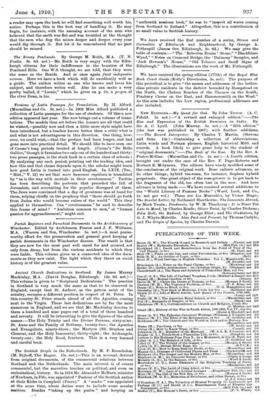Versions of Latin Passages for Translation. By M. Alford. (Macmillan
and Co. 5s. net.)—In 1902 Miss Alford published a collection of Latin passages for the use of students. Of this a new edition appeared last year. She now brings out a volume of trans- lations. The models thus set before the learner are all that could be wished,—poesibly now and then a little more style might have been introduced, but a teacher knows better than a critic what is and what is not advantageous in this direction. One thing, how- ever, we could wish,—that the preface had been longer, and had gone more into practical detail. We should like to have seen one of Caesar's long periods treated at length. (Caesar's "De Bello Gallico," though it furnishes two only out of the hundred and thirty- two prose passages, is the stock book in a certain class of schools.) By analysing any such period, pointing out the leading idea, and how this and that clause depends upon it, the scholar might learn how good Latin is turned into good English. In L%1%. (Tac., " Hist.," V. 12) we see that more humanae cnpidinis is translated by "as is the way with mortals in their covetousness." Tacitus has been describing the portents that preceded the fall of Jerusalem, and accounting for the popular disregard of them. The Jews were convinced that a day of greatness was at hand for them, relying chiefly on the prophecy that " those should go forth from Judea who would become rulers of the world." This they applied to themselves. Can "covetousness " be said to describe this frame of mind " Ambition common to men," or " human passion for aggrandisement," might suit.


















































 Previous page
Previous page